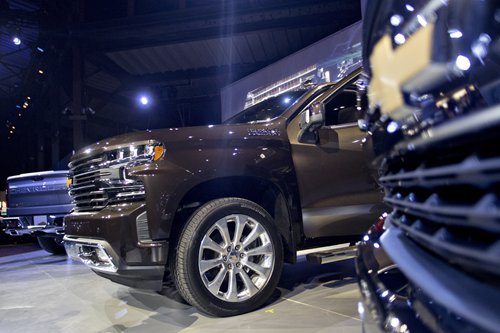United Auto Workers union pushes GM to boost US auto production

A General Motors Co. (GM) 2019 Chevrolet Silverado pickup truck sits on display during the 2018 North American International Auto Show in Detroit, Michigan, US, on Jan 13, 2018. Photo: VCG
The United Auto Workers (UAW) union's top negotiator in talks with General Motors Co (GM) to resolve a more than three-week strike said on Tuesday a key issue separating the two sides is job security.
"We have made it clear that there is no job security for us when GM products are made in other countries for the purpose of selling them here in the US," UAW Vice President Terry Dittes wrote in a letter to UAW officials. "We believe that the vehicles GM sells here should be built here. We don't understand GM's opposition to this proposition."
The strike at the US' biggest carmaker began on September 16, with its 48,000 UAW members seeking higher pay, greater job security, a bigger share of the automaker's profit and protection of healthcare benefits. The strike has cost GM more than $1 billion and forced it to idle operations in Canada and Mexico.
GM declined to comment on the UAW letter. The sides have exchanged numerous proposals since the strike began.
GM's production of trucks and sport utility vehicles in Mexico has drawn anger among union workers.
Through August, 526,000 of the 573,000 vehicles GM exported from Mexico were sent to the US, equal to about one-quarter of its US sales. US President Donald Trump and many lawmakers have also urged GM to build more vehicles in the US.
GM announced in November 2018 it would close four US factories, including two assembly plants, and cut 15,000 jobs in North America.
GM said in September before the strike began that it had offered to make $7 billion in new US investments in eight facilities in four states, but it did not specify timing, location or products with the exception of a planned electric truck.
UAW workers are concerned that as GM shifts to more electric vehicles it will require fewer workers and that battery production may result in workers getting paid less than at existing transmission plants.
Reuters has reported that GM has told the UAW it could build a new battery plant near the now shuttered Lordstown, Ohio factory.
To date, the strike has hit as many as 150,000 workers in the auto industry, a report from research and consulting firm Anderson Economic Group (AEG) showed.
About 75,000 employees of auto parts suppliers have either been furloughed or have seen their wages shrink due to the slump in demand from GM, according to the AEG report.
About 5,000 workers at Michigan auto suppliers have filed for unemployment benefits as a result of the strike.



